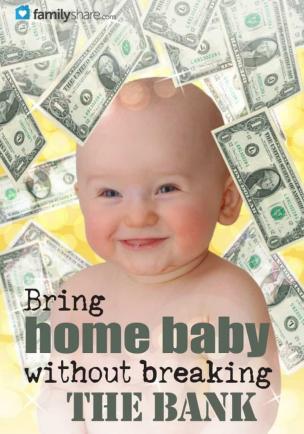
The Department of Agriculture says the average cost of raising a child from birth to 18 is $226,920. Why the Department of Agriculture? I guess because they know how to grow things.
Congratulations on your new bundle of joy and expenses! Now is the time to get smart about your purchases, plan ahead and enjoy every minute. Your best money-saving resource is other parents. Talking and shopping with experienced parents will help you know what you REALLY need to buy and what is simply marketing pressure.
Here are some tips to help you start saving money right away:
Decide how much privacy is worth to you. Some hospitals charge an add-on fee if you request a private room
Find out ahead of time what your insurance covers and how much any extras will cost you out-of-pocket.
Get the goodies
Manufacturers usually send new moms home with tons of samples. Even if you're planning on nursing, take the free formula. More than 85 percent of moms stop nursing exclusively by the time their baby is 6 months old, which means that you'll probably end up spending money on formula at some point.
Just ask
The hospital often stocks your baby's bassinet with baby-care items. Ask the nurse if you're allowed to take them. If you leave them behind you may be charged for them anyway.
Breast is best
Consumer Reports estimated the cost of feeding an infant formula for a year at $2,000. But wait until you know breast-feeding will work for you before you buy a nursing wardrobe.
Bottle feeding
If you need to feed with formula remember that store-brand formulas and brand-name formulas both meet the same nutritional requirements. Sign up for freebies from formula companies at welcomeaddition.com , enfamil.com, and brightbeginnings.com. If your baby needs a special formula blend, find out if your insurance will cover the difference.
Announce for free
Save money on stamps by sending an electronic birth announcement. You can use sites like Babyzone.com or OhBaby.com to help you design something special. You can set up a photo website for free at sites like snapfish.com, picasa.com or kodakgallery.com
Be patient
You don't need to buy a high chair before the baby comes home. Spread out your big purchases and your credit card won't take such a hit. One thing you must have is a good car seat BEFORE you bring Junior home from the hospital.
Choose quality
Your hard-earned money is best spent on things you'll really use and where safety truly matters; such as a quality crib, stroller and car seat. Read reviews on high ticket items before you buy. Your baby won't care if you buy clothing and toys at a yard sale or second-hand store.
Watch sales and growth
Babies grow fast, so you're not going to need as many newborn outfits as you think. Buy clothes one size up. Watch for seasonal sales, but realize that it's not a bargain if you get next winter's coat and it doesn't fit because your little one grows faster than expected.
Choose unisex shades and styles
Sure, you'll want to buy some pink or blue. But if you plan on having more than one child, invest in some unisex colors like yellow, green, and white. Buying white onesies is cheaper in the long run because you can easily bleach them.
Buy secondhand special-occasion clothes
You'll save a bundle by shopping at your local consignment shop, especially for those more expensive fancy outfits or holiday ensembles.
Free is always better
Babies outgrow things so quickly, consider checking out Freecycle.com, a website where people give away things they no longer need. Just be sure items are safe and haven't been recalled at CPSC.gov.
Invest in double-duty furniture
You're going to have a kid longer than you're going to have a baby. Buy a high chair that converts into a booster, a crib that becomes a toddler bed and a changing table that look like a dresser. Better yet, buy a dresser that you can put a changing pad on.
Get cost-effective answers to health questions
Most doctor's offices, hospitals and insurance companies have a free nurse help-line you can call in the middle of the night. A quick phone call to your doctor might save you a co-pay. Asking your doctor for free samples can help stretch your dollars.
Take advantage of tax deductions
Twenty to 35 percent of child care expenses are deducted, depending on your income. Check with your tax advisor to learn about additional benefits available in your state. Also check with your employer to see if the company offers a dependent-care account where you can contribute an annual amount in pretax dollars for qualifying dependent care expenses.
Hunt online for deals
Discount deal sites like Groupon and Living Social can save you as much as 70 percent off retail. These sites feature new mom tips: MomAdvice.com, Mommysavers.com and Babycheapskate.com. Be sure to check out Amazon Mom, a free program that offers discounts and free two-day shipping with Amazon Prime membership. You can also get 20 percent off diapers and wipes with their "Subscribe & Save Delivery."�
Create a babysitting co-op
Find other moms who might like to trade a few hours of babysitting. You won't have to come up with extra money for a babysitter and your little ones will make friends. Nanny share care is a popular choice among moms who want and can afford more help.
With a little careful planning you can make your baby budget go a long way.
If you know someone who is expecting a little one, feel free to share this article with her.

